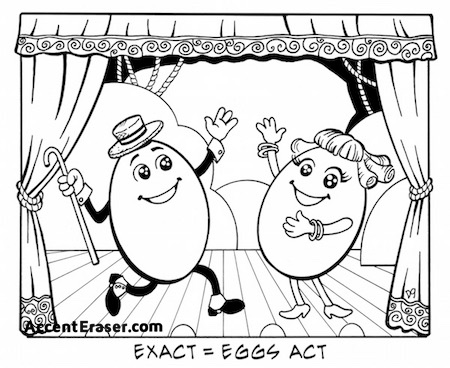
The English language has many subtleties that can lead to confusion. This includes letter combinations that may be pronounced differently in different contexts. For example, many words in English begin with two simple letters: “ex”. This is just one letter combination, but it has two very different pronunciations. Let’s work together to see why this happens, and to understand when to use each one.
We can start by looking at the two letters involved, by first looking at the “e” in these words. It is pronounced “eh” as in “bed” – International Phonetic Alphabet (IPA) /ɛ/.
Next, there’s the letter “x”. This is where the trouble starts. Usually, “x” is pronounced as /ks/, like at the end of the word “backs”. So, we should pronounce “ex” like /ɛks/, right? That would make sense, but it turns out it’s not always true. Sometimes, it is pronounced as /gz/. That may sound strange at first, but let’s delve a little deeper into why and when we use the /ks/ sound versus the /gz/ sound.
First, let’s give some background about English sounds. English sounds can be divided into two categories: voiced and voiceless.
When you pronounce voiced sounds, your vocal cords vibrate. When you pronounce voiceless sounds, your vocal cords do not vibrate. You can test this by laying your hand flat over the front and center of your throat (the place where the Adam’s apple is on a man) and saying “sss”. You should not feel any vibration. Now, with your hand still on your throat, try saying “zzz”. You should feel the vibration of your vocal cords.
The sounds that are made without vibrating the vocal cords are called voiceless sounds. These include: h, p, t, k, f, s, “th” as in “think”, “sh” as in “ship”, and “ch” as in “cheese”.
When a sound requires vibrating the vocal cords, we call it a voiced sound. Some examples of these are: b, d, g, v, z, “th” as in “the”, “zh” as in “pleasure”, “j” as in “joke”, m, n, “ng”, l, r, w, “y” as in “yes”, and all vowel sounds.
We can pair some sounds into voiceless/voiced pairs. When two sounds are paired in this way, we mean that everything about the way you make the sounds is the same – what your lips, jaw, teeth, tongue, and everything else are doing are the same, with one exception. For the voiced sound of the pair, your vocal cords are moving, and in the voiceless sound of the pair, your vocal cords are not moving. Here are the pairs:
| Voiceless | Voiced |
| p | b |
| t | d |
| k | g |
| f | v |
| “th” as in “think” | “th” as in “the” |
| s | z |
| “sh” as in “ship” | “zh” as in “pleasure” |
| “ch” as in “cheese” | “j” as in “joke” |
You’ll see that the typical pronunciation of “x” is /ks/, which is a blend of two voiceless sounds. As you can also see from the chart, /gz/ is the voiced equivalent of /ks/, in other words, you make the /ks/ sound the same way as you make the /gz/ sound, except when you say /gz/, you are using your vocal cords. Now, let’s get back to when to pronounce “x” the “voiceless” way, as /ks/, and when to pronounce it the “voiced” way, as /gz/.
How to pronounce “ex”:
- When the next sound in the word is a consonant sound: pronounce it the voiceless way, as “eks”, IPA: /ɛks/
Examples: exceed, excellent, except, excess, excite, exciting, excuse, expect, expire, exterior, extra, extraordinary, expatriate, extrovert - When the next sound in the word is a vowel sound: pronounce it the voiced way, as “egz” (Yes, that sounds just like the word “eggs”!), IPA: /ɛgz/
Examples: exact, exactly, exaggerate, exalt, exam, examine, example, exhibit, exist, exorbitant, exude
So the word “exactly” is pronounced “egz-akt-lee”, and so on.
FUN FACT: the fact that “x” can sometimes be pronounced as “gz” can lead to some fun puns, such as the final joke of this British comedy skit. I linked straight to the joke, but it’s so funny I definitely recommend watching the whole thing!
Do you have more questions about American English, or are you interested in accent training? Reach out and contact me!
